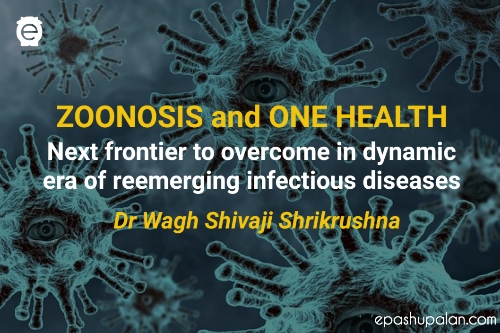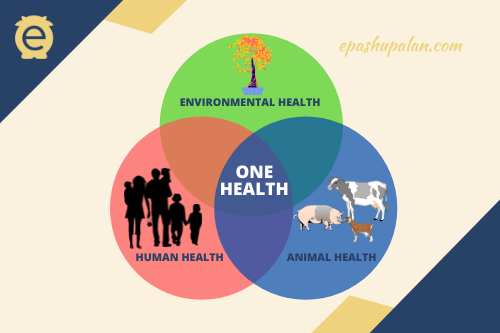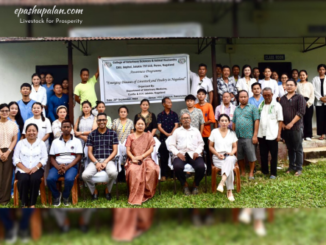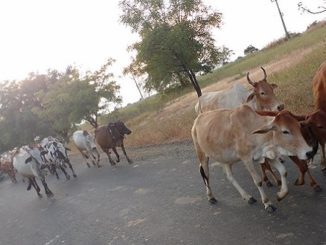With latest outbreak of novel corona virus (COVID-19) world has come to standstill and started knowing the importance of the concept zoonosis. According to the world health organization zoonosis is categorically defined as the any disease or infection that naturally transmissible from vertebrate animals to humans. Animals are critical reservoir of varied number of infectious agents in the natural habitats. With increase in rising human population and thereby encroaching upon the native forest land which hitherto been known as natural habitat for animals causing infectious diseases to transfer from animals to humans and thereby causing public health crisis. The dietary habits have been changed over the period towards the more protein intake which ultimately has led to rapid consumption of animal origin food resources. Animal origin food is essential for healthy lifestyle but safety precautions are warranted and proper food hygiene is needed at every level of food value chain. Animal origin food as such will not cause any harm to human health as such as in the case of recent corona virus outbreak. With rising global climate extreme phenomenon and in the era of emerging and reemerging diseases it imperative upon human society to collectively think about the one health concept. The humans and animals are also cohabitants and since their close association gives scientific community to robust evaluation mechanism to rethink over zoonosis.

One health concept
Human existence is attached to the wide ecological operations and in fact humans are one of the crucial part of ecology. Isolation view of considering animals not the carrier of any diseases will defeat the purpose of combating zoonosis and thereby stemming the emergence thereof.

According to the WHO one health is often considered as the policy design, deliberation and implementation where in multi sectorial approach is taken into account for the betterment of public health.one health focuses mostly on the food safety ,emerging disease, zoonosis(rabies, rift valley fever and TB etc.) and widespread antibacterial resistance. The global health systems keeping more emphasis on these lines and have started overwhelmingly making people aware about these pressing issues.
Animal health importance
Food animals such as pigs, goats and sheep’s along with poultry meeting the ever increasing need of animal origin protein sources therefore their healthiness is of utmost importance to humanity as a whole. Contaminated foods with underline infectious diseases can pose sever pressure and danger on public health. The animal treatment should be given priorities at par with the human medical interventions so as to curtail the menace of transmission of theses zoonotic diseases from animals to humans. Indian meat sector has been flourishing and rising demand across the globe for value added meat products.
Anti-bacterial resistance
With ever increasing production of the meat and meat products poultry sector specifically and piggery in general incorporating the antibiotics in the food chain so as to gain the body weight and thereby profitability. Menace of antibiotic resistance creating huge public health hazards. The unnecessary use of antibiotics as growth simulator or for eradicating any infectious disease has exacerbated the existing problem in the food ecosystem. Rampant use of antibiotics have catastrophic health implications as it enters in to food chain and has potential of bio magnification and bio-accumulation as a residues which can long last in the human system.
If lactating animals are treated for infectious diseases using antibiotics then it is essential to withhold the milking of such animals for week or two to eliminate the antibacterial residues.
Therefore it is of paramount importance to prevent the use of antibiotics injudiciously and limiting it for disease control only with extra precautions from public health point of view.
As world is globally interconnected ever before ,no one is literally isolated and secured unless robust evolutionary and monitory system is put in place as enshrined in the agreement on agriculture protocol of WTO. As world is globalized through different trade related protocols it is essential for member countries of WTO to strictly follow the trade related sanitary and phyto sanitary measures and respective agreements.
As India lies in subtropical belt experiences the tropical weather pattern with different seasonality due to atmospheric phenomenon. As it is well established that emerging and reemerging diseases are more prevalent in the tropical and tropical belt as it harbors the maximum arthropods vector population which precisely acts as the vectors for disease transmission.
India has great animal resource potential which should be harnessed judiciously and exploited for greater good of humanity. Indigenous animals are mostly resistant to the most of infectious diseases as they have better thriving and adaptive potential. Having said so it is also equally important to increase the disease surveillance so as to monitor it on real time basis and thereby containing any possible disease outbreak in future.
The best way forward is to implement the one health mechanism and thereby aware population at large.
The future prospects:
- Adapting sustainable livestock productivity by infusing environment friendly methods for animal productivity
- Respecting human-animal interface
- Relying on local organic local resources so as reduce carbon footprint






2 Trackbacks / Pingbacks